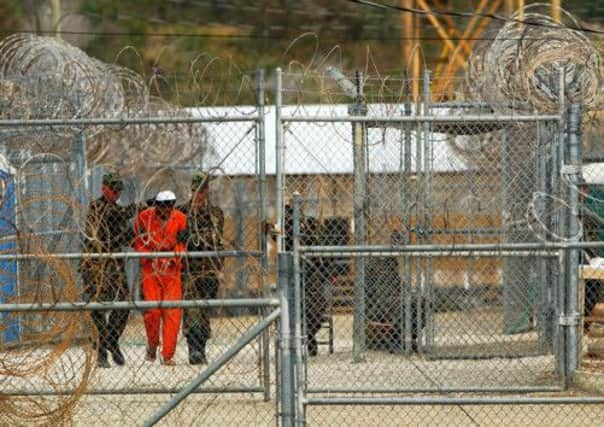US questioning suspects on ‘floating Guantanamos’


Abu Anas al-Liby, one of the FBI’s most wanted terrorist suspects, sought for his alleged role in the 1998 bombings of US embassies in Africa, was captured this weekend in Libya. He is now held aboard the USS San Antonio, an amphibious assault ship currently in international waters in the Mediterranean.
As of yesterday, Liby had not been read his rights under US law, which include the rights to remain silent and speak to a lawyer. It remains unclear when he will be brought to the United States to face charges.
Advertisement
Hide AdAdvertisement
Hide AdThe Obama administration publicly debuted the naval ship interrogation tactic in 2011 when it captured Ahmed Abdulkadir Warsame, a Somali citizen who the US government said helped support and train al-Qaeda-linked militants.
Warsame was questioned aboard a warship for two months before he went to New York to face terrorism charges. He pleaded guilty earlier this year and agreed to tell the FBI what he knew about terror threats and, if necessary, testify for the government.
Questioning suspected terrorists aboard warships in international waters is president Barack Obama’s answer to the Bush administration detention policies that, as a candidate, Mr Obama promised to end.
During the Bush years, by holding people in secret prisons – known as black sites – the CIA was able to question them over long periods, using the harshest interrogation tactics, without giving them access to lawyers.
Mr Obama came to office without a ready replacement for those secret prisons. The concern was that if a terrorist was sent directly to court, the government might never know what intelligence he had. With the black sites closed and Mr Obama refusing to send more people to the US detention facility at Guantanamo Bay, Cuba, it was not obvious where Washington would hold people for interrogation. And that’s where the warships came in as “floating Guantanamos”.
On Saturday, the US army’s Delta Force and Libyan operatives captured Liby in a raid. A team of US investigators from the military, intelligence agencies and the Justice Department has been sent to question him on board the USS San Antonio.
Liby, who was indicted in 2000 for his involvement in the 1998 bombings of US embassies in Africa, was being held on the warship in military custody under the laws of war, which mean a person can be captured and held indefinitely as an enemy combatant, an Obama administration official said.
“It appears to be an attempt to use assertion of law of war powers to avoid constraint and safeguards in the criminal justice system,” said Hina Shamsi, a lawyer with the American Civil Liberties Union. “I am very troubled if this is the pattern that the administration is setting for itself.”
Advertisement
Hide AdAdvertisement
Hide AdThe White House would not discuss its plans for prosecuting Liby.
The interrogators sent to question Liby are part of the same group that questioned Warsame – the High-Value Detainee Interrogation Group. The Obama administration created the group in 2009 to juggle the need to extract intelligence from captured suspected terrorists and preserve evidence for a criminal trial.